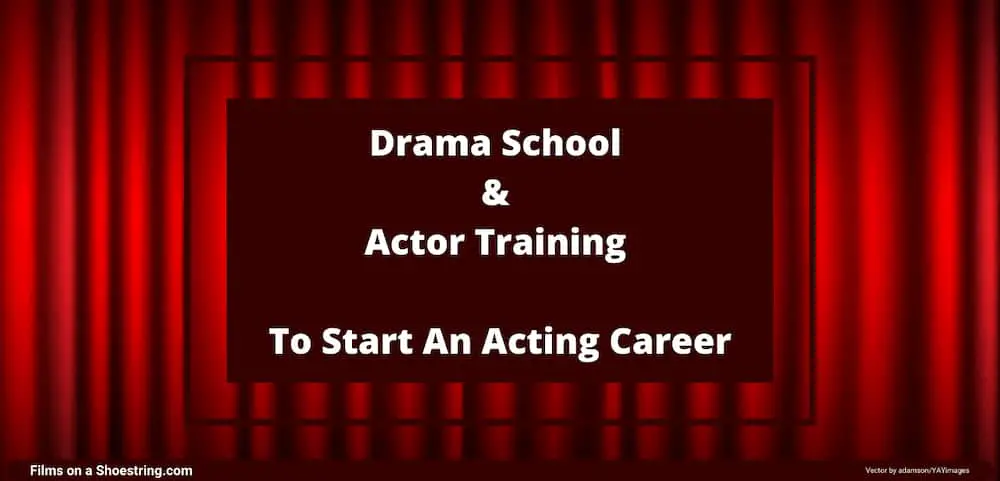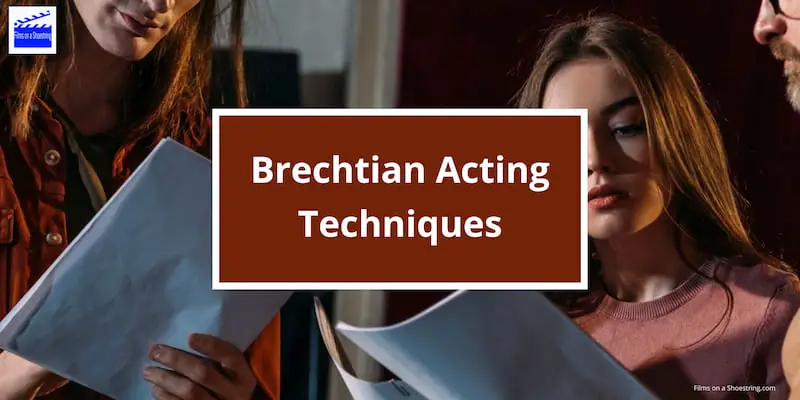It’s possible for young and mature adults to become an actor without drama school. And there are plenty of working child actors and teenage actors who don’t attend full time stage schools. But while actor qualifications aren’t essential to access talent agents and casting directors, acting training is an investment in your career which you need to start an acting career.
Yet it’s a complicated minefield of different options according to your age and circumstances.
Thanks to intense competition from thousands of applicants, your chance of getting into a top drama school is very low, even if you can afford it.
And every professional actor needs to learn and develop their craft throughout their career, whatever acting qualification they already hold.
We’ll start by outlining the main areas of performance that actors specialise in. If you know which roles you see yourself in, you’ll target more appropriate training.
Then we’ll move on to the huge range of stage schools, drama schools, classes and workshops available.
What training do you need?
Some people are great all-round performers, and others excel in one or two areas only. Identify your strengths and ambition.
It matters in terms of the training you need, the choice of longer courses, and the roles you ultimately want to seek.
Think carefully about what you’re most appropriate for, and where your passion lies.
Straight Drama
The term straight drama refers to plays, TV drama, film, where the actors deliver the lines and actions in a realistic way. Theatre roles commonly demand drama school training; TV & film roles rely on previous experience and great auditions. You’ll increase your work opportunities by learning other accents or becoming a skilled physical actor. Many performers also take a short course in audition technique, stage combat, screen combat, archery, fencing or horse riding.
Comedy Drama
Comedy drama relies on a performer’s good comedic timing. Stand up comedy is a typical entry route for comic actors. Panto is a great training ground for developing comedy skills too.
Musical Theatre
Professional musical theatre performers act, dance and sing to masterful levels. Those three performance specialisms put together are called the triple threat. It’s difficult to win musical theatre roles without intense performing arts training at a stage school or drama school.
Dancers
Some people just want to dance, with a bit of modelling or commercial work thrown in. Since exceptional dance skill is needed for professional dance roles, a high level and specialised training programme is just about mandatory.
Commercial Work
Commercials, advertisement images and company marketing videos need good looking (sometimes quirky) individuals and groups playing the roles of everyday people. The right look and excellent attitude in the casting process wins commercial work.
Voice Actors
Don’t underestimate the skills needed when portraying characters through every emotion possible using your voice alone. Plus, you’ll need to add a variety of accents with laser sharp focus for the audience to concentrate on the character rather than your bad voice acting. Training, experience and practice all help.
Supporting Artists
Supporting artistes, or extras as they are commonly known, are not actors. They just have to silently reproduce everyday interactions in the background without distracting the viewer’s attention away from the main characters. So training isn’t essential, although some agencies run or recommend short courses for extras.
Acting Techniques
A number of different acting techniques and methods have developed over the past century. They include the Stanislavski Method, Classical Acting Technique, Method Acting Technique, Meisner Technique, Chekhov Technique, Practical Aesthetics Acting Technique, Uta Hagen Technique and Viola Spolin Technique.
Courses and workshops sometimes specify which technique the course leader or coach specialised in. It’s not something to get unduly focussed on unless you have an interest in a particular method. But do a bit of research before attending a drama school audition or acting workshop if the promotional material talks about a specific acting technique.
Where To Find Acting Training
This next section contains an overview of the types of acting training available for different age groups.
Kids Classes
Interviews with successful child actors often reveal that they started dancing classes at the age of 3. It’s actually a great place to see how your child handles set pieces performed to a crowd of strangers. Plus dance exams with an examiner prepares them for the audition rooms of casting directors.
Many drama groups for youngsters have also sprung up, including franchises. Some are packaged with dance instruction under the label of Theatre Arts Schools or Performing Arts Schools. Others are community groups in church halls led by volunteers. Their entry levels, standards and expectations all differ.
Your child should be performing to a crowd of parents at least twice a year. Plus they’ll work towards LAMDA exams, or something equivalent.
Kids classes usually accept youngsters up to the age of 18, with students allocated to sessions of their own age group.
Elite students compete in dance and scholarship competitions, or in drama festivals, on a regular basis. Those students are trained for entry to dance and musical theatre programmes at drama school. If you can’t find this level of training in your local area, look for one of the national providers. They include Spirit YPC (Young Performers Company), and Stagebox.
Stage School
The term stage school is sometimes used by local evening and weekend dance and drama centres.
However, here we are looking at the full time stage schools. They provide a full academic curriculum as well as high level triple threat training. Nearly all of them are run privately, and some are boarding schools too.
Students typically stay until the end of 6th form. Then they work in the industry, or move on to further training at drama school.
Stage schools either run their own agency or collaborate with an independent talent agent. Therefore, their pupils gain access to auditions and acting jobs from a young age.
For those unable to afford the full time training, some stage schools offer weekend and summer courses too.
Youth Theatre
Most youth theatres around the UK accept 11-18 year olds. Some start much younger, perhaps as young as 9 or even 7. Some are run by established theatres bringing in paid tutors, while others are run by community or charitable organisations.
Not many youth theatres follow an exam schedule in the way a Theatre Arts school will. Instead, focus is on a play each term or so, plus additional special events. This may be collaborative work with other youth theatres, or participation in schemes such as National Theatre Connections. Others collaborate with filmmaking courses.
Young Performer Companies
Some theatre venues have young Performer Companies, or Young Actor Companies, aimed at 18-24 year olds. The tutors are likely to be trained professionals paid to develop the skills of the young company members. Their shows include local productions for friends, relatives and theatre supporters, through to national events such as National Theatre Connections and even sometimes Fringe festivals.
There are also musical theatre young performer companies run privately, which train exceptionally talented triple threat performers, usually from the age of 11. In addition to regular workshops and classes, the companies also perform at a professional level in London and release popular YouTube videos. They include Spirit YPC (Young Performers Company), and Stagebox.
National Youth Theatre
Each year, the National Youth Theatre (NYT) auditions 6,000 young actors aged 14-25. About 750 of them receive invites to the summer welcome course, productions, or one of the long term training programs.
Both confer NYT Company Membership. That allows you to audition for one of the NYT shows, and the REP Company. You also gain access to NYT workshops, and can apply for the Creative Leadership programme.
In addition, masterclasses are run in:
- Acting for Screen and Self-Taping
- Audition Technique
- Comedy and Improvisation
- Directing
- Writing for Stage and Screen
- Performing Shakespeare on Stage and Screen
Competition for NYT membership is intense, but it’s worth coming back to the acting audition year after year. Membership of the National Youth Theatre is something talent agents and casting directors take note of.
Summer courses are also run for newcomers aged 18-25 interested in the following Backstage skills:
• Costume design and making
• Lighting, video and projection
• Stage sound design and composition
• Scenic construction and set design
• Stage management
Many young people attending the Backstage skills course go on to study these technical theatre subjects at college and university.
Colleges for performing arts
After GCSEs, aspiring performers have a choice to make.
Some choose A-Levels, perhaps including A-level drama. They spent a lot of leisure time in theatres and workshops. After that comes a drama degree, drama school or perhaps a complete change in direction.
For others, a more practical training route is preferred. Colleges offering performing arts training typically offer a practical-based, vocational BTEC qualification. Assessment focuses on coursework and projects, supplemented by externally marked tests.
It doesn’t stop there, though. BTECs are recognised as a qualification for university entry. Alternatively, many colleges offer their own degree programme. So if you loved your BTEC course at your college, you can stay and earn a degree there.
The majority of students attend their local further education college. That saves living costs, and most UK students also have their BTEC course fees covered by the government too.
However, it’s hard to make the transition from FE college to industry work. You’re far less likely to see casting directors and major talent agencies at your final showcase. Work out where the alumni are working in the industry, and whether this is what you are aiming for. Although bear in mind too that living far outside London limits access to castings and jobs.
In addition to local FE colleges, investigate private colleges for performing arts. Since their sole focus is to train students for the industry, it can be a good choice both for professional development and to submerge yourself into the creative world.
Young REP Companies
Pre and post-war, young actors were just as likely to train with a rep company as with a drama school. One small company performing several plays a season gives each member solid practice in understanding and learning scripts, bringing a wide variety of characters to life, and incorporating the director’s instructions into the performance.
Unfortunately, over the past few decades repertory theatre all but died out. The value of using rep theatre to train young actors who couldn’t afford drama school has never been forgotten though. So you still find these groups operating, including the National Youth Theatre REP Company, Theatre Peckham REP company, and Fourth Monkey actor training company.
Acting Classes
Acting classes take many forms. However, acting classes are usually run as a course of several lessons about acting, rather than a one-off event which is called a workshop, or masterclass.
Acting classes take many forms, and for different audiences:
- Acting classes for kids
- Acting classes for teenagers
- Beginners acting classes
- Acting class for adults
- Acting classes for professional actors
Subjects offered in acting classes include:
- Acting technique classes
- Acting for screen classes
- Audition technique classes
- Scene study classes
- Sight reading classes
- Improvisation classes
- Stage combat courses
- Movement classes
- Vocal training
- Voiceover classes
- Classical acting technique
- Comedy Acting classes
We have a separate page about acting classes for adults and children in Liverpool.
Benefits of acting classes
Children get a confidence boost from acting classes. They are supported to express themselves emotionally and creatively, learn to collaborate and encourage others, develop public speaking skills, and experience the joy of entertaining a crowd.
If you couldn’t afford drama school, or found it too difficult to get in, then acting classes teach you the techniques you need to know, and give you space to practice your skills. There’s a lot to learn, and this is an affordable way to do it.
You may be wondering why professional actors, including those who went to drama school, attend acting classes. It’s good to keep refreshing your craft, and you may learn new things. In an industry which only awards jobs to a minority of those who apply, and who expect perfection from every individual on every job, you can’t afford to sit back thinking your actor training is complete.
Attending acting classes at a venue focussed on services for performers can also provide a chance to socialise, make friends and build a network. An acting career is emotionally demanding, and friends outside the industry rarely understand the pressures of insecure employment in an ultra-competitive field.
Free Acting Classes
Free acting classes are rare, and usually found as a ‘taster’ session for a paid course. Actors spend enough time working for free to get showreel, try out new ideas, help friends out etc. They certainly shouldn’t be asked to run classes for free too. Where classes are free, they tend to be part of voluntary or charity events, rather than supported directly by the state.
Workshops & Masterclasses
Workshops and masterclasses are usually about two hours long, though full day and even two day events are offered. While somewhat flexible, workshops suggest more participant activity, and masterclasses a chance to listen and learn from an expert. However, the reality is a little more fluid so masterclasses can be an opportunity to practice your new or developing skills as much as in a workshop.
Workshops and especially masterclasses are led by an expert in the session’s topic. So, for example, casting directors run casting workshops and masterclasses. Tutors known for their expertise in an acting technique run specialist workshops in the same technique. Of course, experienced industry professionals can offer insight into a range of acting skills and techniques. It’s just that the limited time of a workshop or masterclass means there is a very tight focus on the specialism identified for the session.
Coaching
Private acting coaching is a service found and used across the UK’s performing arts industry. The one-to-one training from an experienced tutor helps you prepare for audition and interview at drama school. Participants can also be coached as part of a group, when there is sufficient time for everyone to perform and receive individually tailored teaching.
Applicants to the National Youth Theatre often seek coaching sessions from a drama teacher or youth theatre practitioner too.
Mature working actors, especially those who did not attend an accredited acting course at a conservatoire or drama school, use coaching sessions to build on their strengths and approach new techniques. It can be particularly helpful in advance of a casting or role.
Accent coaching is used by working actors preparing for a role. The tutor is a specialist practitioner who usually works over several sessions, essentially running a short course for an individual. Sometimes accent coaches also run sessions at an acting class, at the invitation of the tutor.
Acting Groups & Drama Clubs
Acting groups and drama clubs come in a wide variety of forms.
Some are collections of friends who gather together in local community venues once a week. Others rehearse three times a week for six months to put on a professional level show at a large regional theatre.
Hundreds of small, non-professional theatres around the country are members of the Little Theatre Guild of Great Britain. Their facilities range from stages hired for the week of the play, up to ownership of their own theatre and backstage buildings.
Needless to say, the opportunities on offer, and the chance to learn and develop acting skills, will vary enormously. You’re not likely to receive high quality physical actor training, but it could be a great place to try out new accents, for example.
If you just want to act as a hobby, this is a good way to regularly perform without the costs, insecurity and competition of an acting career. However, if you are serious about working as a professional actor, you might need to seek an acting course too, depending on what’s on offer. Acting groups and drama clubs do give you the opportunity to practice acting with other participants, but likely without the industry focus and access to talent agents and casting directors that help you become a working actor.
One Year Actor Training Programmes
A number of full time programmes for actor training last for one year or less. This is a way to access specialised teaching for those who don’t get into drama school degree programmes, or those who can’t afford drama school.
Here are three examples:
9 Month Acting Training in London
The National Youth Theatre runs the free 9 month long Playing Up programme. Aimed at 19-24 year olds not in education, employment or training, students work towards an Access to Higher Education Diploma in Theatre Arts.
12 Month Acting Training in London
The National Youth Theatre runs the 12 month long Stepping Up programme. It’s aimed at 19-24 year olds not in education, employment or training, who also do not have a full Level 2 qualification (i.e. less than 5 GCSEs). Some places are reserved for young people with learning disabilities. Students work towards a Certificate in Progression in Theatre Arts.
12 Month Acting Training in Newcastle
The Theatre Royal in Newcastle upon Tyne runs Project A. Led by an artistic director and supported by leading industry specialists, the course aims to create working actors in twelve months. The fees are much lower than industry norms for this type of training.
Foundation Degrees In Acting
A foundation degree is one academic year before the first year of a degree.
Competition for places at drama school is intense, so many drama schools now offer foundation degrees. Entry is normally offered to students who made it to the final round of auditions for the 3 year BA(hons) degree, but just missed getting a place.
The institution’s aim is to offer an acting programme which helps widen and develop the student’s acting skillset. By participating, the students hope they’ll later win a place on a 3 year BA(hons) degree at one of the major drama schools.
The foundation degree course at a drama school does not give you a better chance of entry to the BA (hons) course unless the skills you picked up on the foundation course make you shine against the competing applicants.
Foundation degrees are very expensive. You have to pay the institution’s fees, and your living costs. The course is too intense to also take on a part time job.
So why do a foundation course? It might be your only chance of being a student at a top drama school. You’ll learn and develop under the instruction of leading tutors. With luck, you’ll win a coveted place on a three year degree programme at one of the major drama schools. But if not, you might have picked up enough high quality acting training to earn a living as a performer. Which, of course, is the point of all this actor training!
Drama School
Competition for places at drama school is intense. You’ll be hard pushed to find any other course in the country more difficult to get on, especially for the three year acting and musical theatre degrees at top drama schools. Your chances of getting into drama school are low.
Furthermore, some of the UK’s top drama school courses limit their places to UK home students only.
What is drama school?
Drama school is an educational institution where you learn to be a professional actor and performer, or one of the backstage professions. It can be at an independent drama school or part of a university. The emphasis is on vocational and practical training, and readiness for industry work.
How much does drama school cost?
UK students on a British degree course pay student fees up to the limit set by the government. They can take out student loans according to the regulations based on household income. Overseas students, foundation students and postgraduate students pay fees set by the institution, without access to student loans.
Independent Drama School
Many of the UK’s top drama schools and conservatoires exist as part of a university, but retaining their traditional brand and identity. It helps them cover a wide array of financial, regulatory and student centred services, while remaining focused on the high level actor training and technical theatre training they exist to provide.
Other drama schools chose to remain independent. Some of them focus mainly or wholly on non-degree training. Meanwhile others are run by their owner or management team without any wish to change the status quo.
Every institution is different, and even students at the same drama school can have significant differences in opinion about their experiences there. So don’t discount drama schools on the basis of their university membership or independent status, because that’s only part of the equation.
Acting Via UCAS
The UK’s best drama schools run degree courses which are applied for via UCAS, either through UCAS Conservatoires, UCAS Undergraduate or UCAS Postgraduate. UCAS Conservatoires process online applications for full and part-time undergraduate and postgraduate music, dance, and drama programmes at nine of the eleven UK conservatoires.
For 2021 entry, UCAS Undergraduate , applications cost £20 for a single choice of institution, and £26 for more than one choice. Applications via UCAS Conservatoires for 2021 entry cost £26 in total.
However, this is the cheapest part of your application! You’ll have to attend auditions. That means travel costs, set monologues, and usually an audition fee too. The UK’s top drama schools have up to 4 rounds of auditions, and even those making it to the final round may or may not win a place.
Meanwhile, you’ll watch friends send off their UCAS applications for academic subjects and get acceptance or rejection emails in response, with not even one interview. It’s usually only the Oxbridge and drama students being pushed to the limit to win a coveted spot at the institution of their choice.
Drama at University
If you’re thinking about taking drama studies at university, be very clear about what you hope to get out of the course.
You can apply for a university degree programme at a drama school, performing arts college or conservatoire. The acting course involves a great amount of intensive, practical work on your acting and performance skills. Every teacher and tutor is an experienced actor trainer, theatre maker or coach. You’ll work towards a showcase, attended by the country’s best talent agents and casting directors.
University courses centred around drama studies have an academic focus. They also examine wider theatre practitioner and backstage roles. You will learn skills and perform, but it’s not at the heart of the curriculum to make you into an actor.
However, this is an industry where you can become an actor without drama school, so even having a theatre studies or drama studies degree is not a barrier to entry. Being able to support yourself for years in London, or with last minute access to London castings, is much more important if you have genuine talent as an actor.
You may also find your degree in drama studies, theatre studies or other performing arts area allows you to enter and progress in different aspects of the entertainment industry. If you’ve specialised too early, you may miss other interesting career opportunities.
University Drama Societies
Every university has at least one group in their drama society. Some have dozens. They each need actors and a wide range of backstage volunteers. Some collaborate with the drama and film courses, bringing in talent and expertise. Putting on performances and volunteering for short films is at the heart of what they do.
Even if you don’t do a drama degree at university, the drama society groups can give you plenty of opportunity to practice and develop your acting skills, or even experience what it’s like to be director or theatre maker.
For some students this is the perfect combination of doing something they love, while also gaining qualifications for a more secure form of employment. Those academic qualifications can pay the bills in the months or years before you earn enough as a working actor to give up the day job.
Postgraduate Drama School
Postgraduate drama school courses focus on actor training and provide theatre training for graduates without a drama degree. It’s a vocational course rather than an academic programme. You are learning acting technique and developing your acting skill, rather than doing academic research into other people’s work.
Talent agencies and casting directors value postgraduate drama school graduates from good drama schools. Life experience, maturity, talent and respected actor training in one performer raises the odds of success.
Money, though, is a barrier. Government bodies rarely fund academic postgraduate courses. They never fund postgraduate performing programmes. So you need to pay the course fees, and cover all your living costs for a year, without an income.
If you work for a year or two between university and drama school, and are careful with your spending, you could build up savings to cover some of the costs. But it’s likely you’ll still need to find sources of charitable funding, in addition to fundraising through friends and family.
Further Reading
So that’s a quick overview of your options for drama school and actor training. If you want to know more about the many other aspects of starting an acting career, here are some articles to help:
How to become an actor without drama school
Accredited drama schools in the UK






